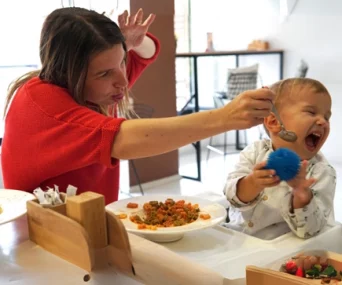Are you concerned about your child’s eating habits? Are they having difficulty with feeding? If so, feeding therapy may be the answer to help your child develop the skills they need to have healthy mealtime habits.
Feeding therapy is an important component of a comprehensive care plan for children with eating problems, such as difficulties with food texture, food refusal, sensory aversions, and other feeding difficulties. Specialized pediatric speech and language therapists provide customized feeding therapy plans to help your child develop the skills necessary for successful eating.
Feeding therapy is designed to address your child’s individual needs and help them build healthy eating habits. During a feeding therapy session, your child will be assessed by a trained professional to identify the issues that are causing difficulty with eating. The team of feeding therapy experts will develop a customized plan to address the areas of concern, including sensory issues, motor skills, and behaviors associated with eating.
How Do You Know Your Child Needs Feeding Therapy?
If your little one is having difficulty transitioning to solid foods, is a picky eater, or has difficulty with food texture, then feeding therapy may be the right choice for you. Here are 10 signs that feeding therapy might be the right choice for your toddler:
1. Your toddler refuses to eat certain food textures. If your child is having difficulty transitioning to solid foods, or has an aversion to certain textures, then feeding therapy may be able to help.
2. Your toddler has difficulty with oral motor skills. Toddlers may have difficulty with oral motor skills such as chewing, swallowing, and biting. If your child is having difficulty with these skills, then feeding therapy may be able to help.
3. Your toddler gags or vomits when eating. If your child is gagging or vomiting while eating, then feeding therapy may be able to help.
4. Your toddler has difficulty transitioning to new foods. If your toddler is having difficulty transitioning to new foods, then feeding therapy may be able to help.
5. Your toddler has difficulty eating a variety of foods. If your toddler is having difficulty eating a variety of foods, then feeding therapy may be able to help.
6. Your toddler has difficulty eating the proper portion size. If your toddler is having difficulty eating the proper portion size, then feeding therapy may be able to help.
7. Your toddler has difficulty self-feeding. If your toddler is having difficulty self-feeding, then feeding therapy may be able to help.
8. Your toddler has difficulty using utensils. If your toddler is having difficulty using utensils, then feeding therapy may be able to help.
9. Your toddler has difficulty with mealtime behavior. If your toddler is having difficulty with mealtime behavior, then feeding therapy may be able to help.
10. Your toddler has difficulty transitioning to a sippy cup. If your toddler is having difficulty transitioning to a sippy cup, then feeding therapy may be able to help.
The benefits of feeding therapy for your child can be seen in improved nutrition and health, as well as improved development, self-esteem, and social interactions. With the help of a feeding therapy specialist, your child will learn to accept new foods, practice healthy eating habits, and develop the skills to feed themselves independently. They will also help them to overcome any fear of eating and to recognize hunger and fullness cues.
If you think your toddler may need feeding therapy, then consider Hope AMC. Hope AMC offers pediatric feeding therapy and has a specialized team of pediatric speech and language therapists that can help children with eating problems. Their team of experienced therapists is committed to helping your child develop healthy eating habits. Through a variety of techniques, such as sensory integration, behavior modification, and nutritional counseling, Hope AMC can help your child overcome eating problems. If you’re looking for a way to help your toddler with eating problems, then consider Hope AMC.






